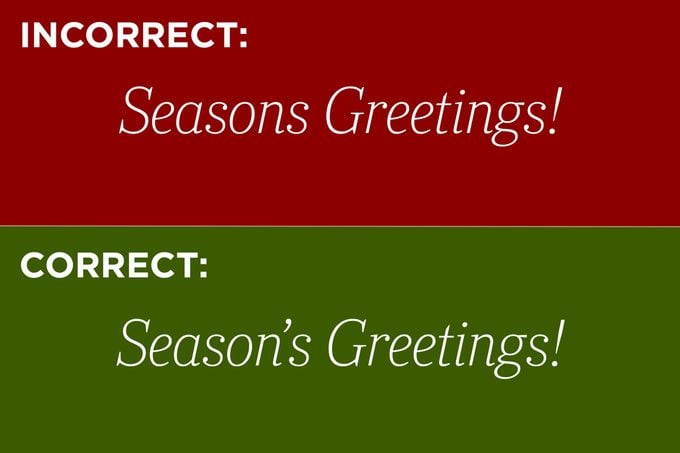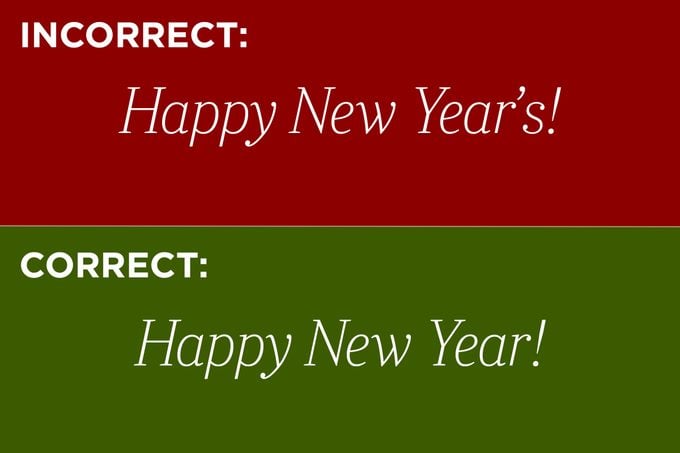6 Common Holiday Card Grammar Mistakes to Avoid
Updated: Nov. 23, 2023
Tip number one: Keep those apostrophes in check!
‘Tis the season for season’s greetings
 Using the phrase “season’s greetings” is a popular way to address a large group of people celebrating a range of winter holidays. But before you mail your Christmas wishes en masse, double check that you’ve included an apostrophe. In the phrase “season’s greetings,” the greetings belong to the season. Thus, the possessive apostrophe is correct.
Using the phrase “season’s greetings” is a popular way to address a large group of people celebrating a range of winter holidays. But before you mail your Christmas wishes en masse, double check that you’ve included an apostrophe. In the phrase “season’s greetings,” the greetings belong to the season. Thus, the possessive apostrophe is correct.
Sincerely, the Jones’s, the Jones’, the Joneses (?!)
You’ll want to finish your holiday card on a high note—not with the incorrect spelling of your family’s name. If your name doesn’t end with an “s,” simply add one (“Happy holidays from the Browns”). If it already ends in an “s” or a “z,” add “es” (“Happy holidays from the Joneses” and “Happy holidays from the Mendezes”). Here are some tips to correctly spell the plural last names on the holiday cards!
To avoid this conundrum completely, say “Happy holidays from the Jones family.” But whatever you do, don’t add an apostrophe. Learn 10 other ways you’ve been using apostrophes wrong.
Happy New Year’s? Happy New Years?
 Keep it simple: “Happy New Year” is strong and clear. “Happy New Year’s Eve” and “Happy New Year’s Day” are also correct. And now that you’ve sent the perfect card, it’s time to work on your New Year’s Eve toast.
Keep it simple: “Happy New Year” is strong and clear. “Happy New Year’s Eve” and “Happy New Year’s Day” are also correct. And now that you’ve sent the perfect card, it’s time to work on your New Year’s Eve toast.
How do you list both kids’ accomplishments?
If you do a letter-style greeting card, you probably want to talk about how little Bobby and Sally are doing. So was Bobby’s and Sally’s piano recital a hit? We’re sure it went well, but that’s not the right punctuation—put the possessive apostrophe-S only on the last name in a list. For instance: “Mary and Joseph’s baby is cute as a button.” To brush up on punctuation rules, read the 13 comma rules everyone should know.
The merriest season
 “Merry Christmas” should be capitalized if it starts a sentence, but if you want to write “We wish you a merry Christmas,” leave the M in “merry” lowercase. It isn’t a holiday name like Christmas is, so the phrase isn’t a proper noun.
“Merry Christmas” should be capitalized if it starts a sentence, but if you want to write “We wish you a merry Christmas,” leave the M in “merry” lowercase. It isn’t a holiday name like Christmas is, so the phrase isn’t a proper noun.
Perfecting the sign-off
You might know to capitalize a sign-off like “Sincerely” or “Love,” but things get hazy when you add in another word. Treat a closing like a sentence and only capitalize the first word. You might end your Christmas card with “Warmest wishes,” “Much love,” or “Hugs and kisses,” followed by your name. Don’t miss these other 41 grammar rules that will make you sound smarter.